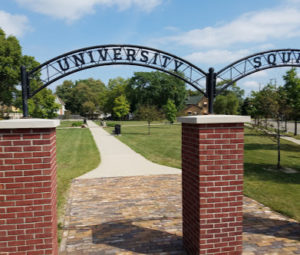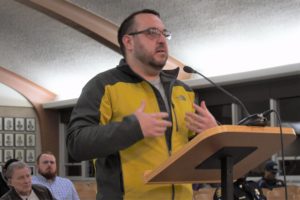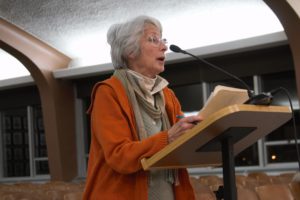By Tom Travis
On Monday, Feb. 24, Flint City Council voted 5 to 4 against a proposed tax abatement for a property development in the neighborhood that birthed General Motors. The decision may mean the end of the project, which has been vigorously protested by a group of its neighbors.
The property, formerly a Hamady grocery store and owned by the Farah family with Troy Farah as a trustee, is at the corner of University Avenue and Grand Traverse Boulevard, just a few blocks northwest of downtown, in the Carriage Town Historic Neighborhood (CTHN). It has been developed in an agreement between Farah and Carriage Town Ministries over the years as a green space known as University Square. The president and CEO of Communities First, Inc., Glenn Wilson, a developer of many Flint projects, has proposed to redevelop the property into a 48-unit complex of affordable housing.
Contacted after the meeting, Troy Farah did not say whether he and his family would continue with Communities First, but added, “My desire is that the property contributes to the improvement of University Corridor and that any use or development of the property would fit within the vision and master plan of the area.”
In a statement provided to EVM after the meeting, Wilson stated,
“It is unfortunate that not everyone can see the bigger pictures around safe, accessible, quality affordable housing in our community. We met with many stakeholders and members of the community, addressing concerns and integrating feedback along the way. Flint was the birthplace of fair housing and this feels like a step backwards not a step forward.” [Full statement found below]
But for Carriage Town residents who opposed the project, this week’s decision was a major victory. Their significant arguments revolved around their objection to the 50-year tax abatement, along with worries about the mass, scale and density of the project, and with their love of the small park, which had been developed with community donations and volunteer efforts.
For Communities First, the goal was to build affordable units for a community greatly lacking such housing.
Ultimately the tax abatement, across the board, became the sticking point.
How the decision played out
In the 5 to 4 vote, Councilpersons Eva Worthing (9th Ward), Allan Griggs (8th Ward), Council President Monica Galloway (7th Ward), Jerri Winfrey-Carter (5th Ward) and Kate Fields (4th Ward) voted against what is called a PILOT ordinance. Eric Mays (1st Ward), Maurice Davis (2nd ward), Santino Guerra (3rd Ward) and Herb Winfrey (6th Ward) voted in favor.

The Carriage Town Historical Neighborhood property Communities First, Inc desired to build a 48-unit affordable housing complex. (Photo by Tom Travis)
The property had been targeted by Communities First (www.communitiesfirstinc.org) to be developed as a 48-unit affordable housing plan consisting of 4 buildings. (See EVM’s introductory article about this property development here.
Wilson was attempting to build the project under a PILOT agreement [payment in lieu of taxes] in one of Flint’s Opportunity Zones. In 2016, the U.S. Treasury Department and the Internal Revenue Service announced Opportunity Zones for development across the country; they offer a tax deferment of 10 years for investors. More information and a map of all Opportunity Zones in Flint can be found at The City Flint’s website.
Late in 2018, residents of the CTHN learned of the plans to develop the property by Communities First, and some began to register frustrations and objections to it.
Nick Kedovary, president of The Carriage Town Historic Neighborhood Association stated, “Our biggest frustration with this whole thing has been the overall lack of transparency with Communities First. They’ve told us a lot of things to sway us to be on board. They told us they planned to work on Georgia Manor.”
Georgia Manor is an already existing, abandoned, apartment complex in Carriage Town CTHN residents said they preferred the idea of Communities First developing an already existing property, rather than filling up University Square.
Kedovary continued, “CTHNA has always been on board for the redevelopment of Georgia Manor. It’s an existing property, it’s empty and it needs to be occupied. If Communities First wants to pursue Georgia Manor redevelopment we would work with them.” Kedovary was frustrated that their original commitment to redevelop Georgia Manor still to this day has never come to be.

Nick Kedovary, president of The Carriage Town Historic Neighborhood Association speaks to city council. (Photo by Tom Travis)
Both residents of CTHN and members of city council praised Communities First for their work, pointing out that Communities First has established itself as a viable and successful developer for affordable housing in the Flint and Detroit area, including rebuilds of Oak Street School, Swayze Apartments, and most recently, the renovation of Coolidge Elementary School into apartments for seniors.
Councilperson Kate Fields (4th ward) said, “Mr. Wilson, I believe that Communities First does good work. And I really believe that you could be an asset to this community because developing is intricate, it is complex. It’s hard to learn how to do all these layers of financing.”
“What I’m not liking here is your stubbornness, your organization’s stubbornness in your insistence that it be on this site. There is no reason for it to be on this site. This Carriage Town Neighborhood, they don’t want it there. They do not want this project there.”
To applause and cheers from the audience, many of whom were from Carriage Town, Fields said, “What are we as council people? We are representatives. Ms.Winfrey-Carter is the ward person for that ward but all of us are here representing the people. And the people are speaking very clearly, they don’t want this project there!”
Wilson responded, “May I explain why it needs to be there? We get funding from the State to build these projects. The projects have to be within a certain distance and parameter. This project is actually within that parameter and that’s why this site was selected. We can’t move it two blocks over because will not be eligible for the funding we’d get for this site.”
But Fields called into question whether in fact Wilson had nailed down funding commitments for the project. In a final round of questioning between City Council and Wilson, along with Michael Wright, Real Estate Development Director of Communities First, Fields specifically noted that there was no “commitments of funding” letter from the Mott Foundation, in fact noting there was “not one letter of commitment of financing” for the project.
Following the meeting, the Mott Foundation released a statement from President and CEO Ridgway White. It said, “Communities First has sought support from the Mott Foundation for several development projects. We supported the Coolidge Park Apartments with $750,000 in grants. We plan to support the redevelopment of Georgia Manor in Carriage Town with an $800,000 grant. However, we declined to support the University Square apartments project because we didn’t feel it had the support of the neighborhood.”
In a previous city council committee meeting, Communities First representatives Wilson, along with co-founder and chief strategy officer Essence Wilson and Wright, spoke in defense of the development plan.
Essence Wilson offered excerpts from a testimonial letter from an unnamed woman who now lives in the Swayze Court Apartments development, a Communities First development that opened in 2017. The letter shared how her life improved since finding secure, affordable housing through Communities First.
Essence Wilson ended, “I encourage you to vote to approve this project. It will keep rents low for members of this community. We also provide a variety of support for residents in our communities.”
Michael Wright pointed out, “This is not a public park- this is a privately held property,” owned by Troy Farah whose family’s grocery store used to sit there.

Communities First, Inc. President and CEO Glenn Wilson stands with Mike Wright, Real Estate Development Director for the organization in Monday’s city council meeting. (Photo by Tom Travis)
Responding to an email from EVM, Farah confirmed his family has owned the property since the late 1970’s. Farah’s father bought the property from the Hamady Brothers and changed the name of Farah Brothers.
Michael Wright drew the council’s attention to a packet of information and drawings describing the proposed development. In the packet were two examples of similar buildings in other areas of the Carriage Town neighborhood – Georgian Court and Georgian Manor. He pointed out those buildings are similar in style and size to the proposed buildings for the disputed University Square lot. He noted that those two present buildings are 25 feet high and the proposed building would be 30 feet high.
Wright further stated, quoting from a letter from the Planning Commission, “The project fits with the future mix land use identified with the property in the Flint Master Plan. The initial project design was revised based on input and suggestions from residents in the neighborhood. The Saginaw Chippewa tribe had no concerns about using this site.”
Two 5th Ward residents voiced support for the development of the University Ave and Grand Traverse Blvd property in Wednesdays meeting. One resident, Frederick Jones, a resident of The Carriage Town neighborhood for 27 years, said, “All the demands have been met. Development is necessary. I urge you to say yes to this project. We need more people living there to pay taxes.”
A second 5th ward resident, Marsha Russell, stated, “What they’re talking about on this property is affordable housing. This is a PILOT component which as I understand is for low income housing in addition to fair market value housing. This project could proceed without this component but it would price those most in need of this type of housing out of that market. The project meets all the standards.”
One of the significant issues for the protesting residents of the CTHN is the size and time span of the tax break–particularly the fact that the tax abatement would last 50 years.
Ron Luczak, a CTHN home owner, stated, “If it was a 10 year tax abatement I might have felt differently about it. I think that the 50 year tax abatement is not in the best interest of our city because we’ve lost so much tax base. If this development was 3 blocks to the north I would support it. There are two city blocks that are completely vacant consisting of 3 acres each.”
City Council President, Monica Galloway (7th Ward) further defended the project in an impassioned plea before the council voted, saying, “You need to understand this is going to be high quality, and it’s going to have to have a group of people that are probably not the people in your minds.”
“We’re giving the PILOT [a tax break or tax abatement] to people who can afford to buy houses and pay property taxes.”
Protesting residents cite mass, density, scale issues
Nancy Sinclair, a CTHN resident since 1977, told the city council, “We feel strongly that destroying an historic district neighborhood by erecting a development in its midst that outsizes it in its mass, density, scale, and setbacks while providing it a 50-year property tax abatement is not in the best interest of our community.”

Nancy Sinclair, a resident of The Carriage Town Historic Neighborhood since 1977 who opposed the development speaks to city council. (Photo by Tom Travis)
Ken Van Wagoner, a CTHN home owner, and longtime owner of Good Beans Cafe, stated in a letter written to city officials and the city council, “Tax revenue collected is used to allow for police and fire departments, libraries, public transportation, education, pensions and many other amenities that are used by everybody.”
“Original PILOT programs were set up for tax exempt organizations like churches, government buildings, schools, and the like could PAY (In Lieu Of Taxes) for a portion of those city amenities they knew they used. They voluntarily agreed to offset the burden on the system by paying something.”
“Corporations figured out if they became non-profit, they could become eligible for, and apply for the tax savings to then pocket the difference. How does that help the city? And to ask for 50 years is just plain greedy.”
“When the entire system in place to protect this Historic District has failed, the City of Flint should at the very least not have to then lose its tax revenue. Past, present and future city of Flint employees should not have to worry if there is a tax base to give them what they were promised”
“Communities First are said to make the statement they “can do this project with or without the PILOT”. For the benefit of all those relying on tax revenue from the city of Flint, I will be asking the City of Flint council members to vote no on this PILOT request.”
Grand Traverse Neighborhood and 5th Ward resident Danny Moilanen, while supporting the Communities First project in Carriage Town, turned to the Carriage Town residents and thanked them for voicing their opinions. Moilanen stated, “I respect many of those who I disagree with tonight.”
Davis and Guerra, in favor of the project, had their say
Councilperson Maurice Davis (2nd Ward) eventually sided in favor of the PILOT program but before the vote he said, “Historic districts are made to be preserved not modernized but preserved.” Davis had stated that as a former Historic District Commissioner and current president of The Civic Park Historic District, he has grown to appreciate the rules and regulations established by the city to maintain their buildings and neighborhood designs.
In a message sent to EVM, Councilperson Santino Guerra, who also voted in favor of the project, stated, “I believe that affordable housing should be available for residents. If we want the city to continue growing we need to have nice places for families to live.”
Winfrey-Carter sides with residents
In the final moments before the vote, 5th Ward Councilperson Jerri Winfrey-Carter, the councilperson representing the people of the CTHN implored, “This isn’t about poor people. It’s called affordable housing which means it’s affordable based on your monthly income. It’s not about poor people.”
“You still have to have a job to live in this apartment development. You still have to have an income, it’s based on your income. That’s what affordable housing means. I’ve lived in affordable housing. It was based on my income…I’m not against affordable housing. I’m all for affordable housing.”

Representing the residents of The Carriage Town Historic Neighborhood in the 5th Ward, Councilperson Jerri Winfrey-Carter explains that she will stand 100 per cent with her constituents. Winfrey-Carter is holding a list of signatures from residents in the 5th Ward who supported the development.
“But what I am against, I’m against Communities First wanting to build a development, a project, in Carriage Town whereas the residents do not want. That’s what I’m against and I’m gonna stand with the residents of Carriage Town. I’m gonna stand with them 100 per cent.” Winfrey-Carter pleaded with her colleagues on council asking them that they would do the same thing. Winfrey-Carter asked them to vote with residents in their wards when they come to them.
Following the council decision, Glenn Wilson provided the following statement to EVM:
“We are disappointed about the vote of the city council and their decision not to support a PILOT (Payment in Lieu of Taxes) to keep rents affordable for residents of this development. A PILOT is NOT a full tax abatement. We would still pay city assessments, fire, police and infrastructure service fees on the affordable units only.
“Additionally we pay taxes on the commercial space and market rate units. We work hard to meet the needs of the Flint community and most of the time there is overwhelming support.
“It is unfortunate that not everyone can see the bigger pictures around safe, accessible, quality affordable housing in our community. We met with many stakeholders and members of the community, addressing concerns and integrating feedback along the way. Flint was the birthplace of fair housing and this feels like a step backwards not a step forward.”
Decision made in a civilized atmosphere
In sharp contrast to many recent City Council meetings, democracy and civility were the tone of Monday’s meeting. For many months Flint city council meetings that been characterized by a debacle of screaming, yelling, racial language and police officers escorting council members out of the council chambers.
Monday’s meeting was a far cry from that. The American ideal of democracy and civility in legislative debate, accompanied by the wishes and opinions of its citizenry on both sides of the argument, rang true in Flint City Hall.
The authors of the First Amendment might have been pleased that their words were heeded in Monday’s meeting, respecting “the right of the people peaceably to assemble, and to petition the Government for a redress of grievances.”
EVM Assistant Editor Tom Travis can be reached at tomntravis@gmail.com.


You must be logged in to post a comment.